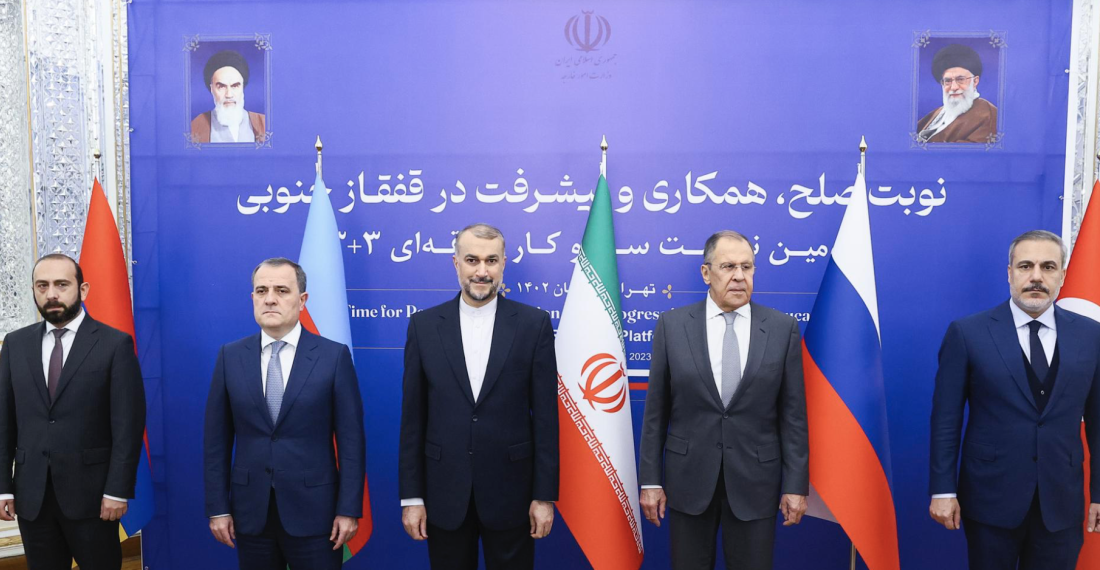The foreign ministers of Armenia, Azerbaijan, Iran, Russia and Turkey, met in Tehran on Monday 23 October in the second meeting of the 3 + 3 format, which however is only 2 + 3 since the third South Caucasus country, Georgia, refuses to participate in the process because of its problems with Russia.
Recently, Turkey and Iran have made statements that they prefer this format of interaction with the South Caucasus countries since it excludes external players. Some Azerbaijani officials have expressed similar views.
At the end of their meeting in Tehran, the foreign ministers issued a nine-point statement, stating:
(1) Taking into account the importance of developing relations between countries based on mutual interests and neighbourliness, they emphasised in this regard peaceful settlement of disputes, respect for sovereignty, political independence, territorial integrity, inviolability of internationally recognised borders, non-interference in internal affairs, prohibition of the use of threats or force, and respect for human rights. importance based on all the principles of the United Nations Charter.
(2) Expressing their positions on various international issues, they discussed the most important issues in the region and emphasized the importance of such platforms as the regional consultative "3+3" platform to provide opportunities for constructive dialogue and establish mutually beneficial cooperation between the countries of the region.
(3) They highlighted the positive impact of economic cooperation on the strengthening of mutual trust, the well-being of nations and the stability of the region.
(4) Emphasizing the importance of cultural cooperation, people-to-people contacts and joint projects in the fields of education, science, tourism, culture and sports.
(5) Bilateral and multilateral consultations and cooperation should be strengthened to promote lasting peace and economic development.
(6)Welcoming the ongoing processes aimed at the regulation and development of relations between all the countries of the region.
(7) Positively evaluating the results of this meeting, they reaffirmed that this platform is open for equal participation of Georgia.
(8) The ministers also exchanged views on the situation in Gaza. They stressed the need for an immediate end to the targeting of innocent civilians.
(9) The Ministers of Foreign Affairs of the Republic of Armenia, the Republic of Azerbaijan, the Republic of Turkey and the Russian Federation thanked the Minister of Foreign Affairs of the Islamic Republic of Iran for the good reception and successful holding of this meeting. Appreciating the periodic meetings of the "3+3" regional platform in terms of expanding and strengthening the environment of trust and cooperation in the region, they agreed that the next meeting will be held in Turkey, the date of which will be coordinated through diplomatic channels.
commonspace.eu political editor said that the absence of Georgia in the 3 + 3 format hugely reduces the significance of the initiative since it is difficult to discuss regional issues without that country being present. However, the format is important, particularly for Iran, which has been desperately trying to have a role in the region. For the Turks, this is an opportunity to share a platform with Armenia, even as discussions on the normalisation of relations continue. The meeting between the Turkish and Armenian foreign ministers, on the margins of the main event, was perhaps the most significant event in the one-day diplomatic extravaganza in Tehran. For the Russians, such a meeting has limited use. They would prefer to deal with the Armenians and the Azerbaijanis on their own, separately or together. But given that their monopoly over dealings with the two countries, especially on the issue of normalisation of relations, has now been lost, Moscow wants to make sure it is present whenever and wherever the opportunity arises.






